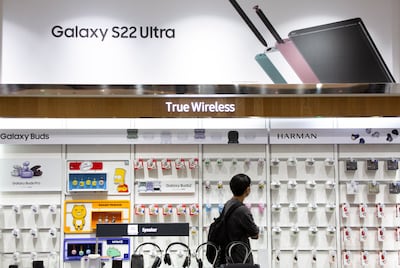Samsung Electronics forecasts a 21 per cent growth in revenue in the second quarter of 2022, a better-than-expected result that tempered investor fears about the embattled semiconductor industry and kicked off a $30 billion rally in the stocks of chip makers.
The South Korean tech company earned 77 trillion won ($59bn) in revenue in three months ended June 30, compared with 63.67tn won in the same period last year, helped by the currency's weakness against the dollar, according to earnings guidance released on Samsung's website.
That sparked a big rally in the stock price of Asia's biggest semiconductor companies on Thursday.
Samsung's shares closed up 3.2 per cent on the Korea Stock Exchange while fellow Korean manufacturer SK Hynix climbed 2 per cent.
Taiwan Semiconductor Manufacturing and United Microelectronics rose 5 per cent and 7.3 per cent, respectively, in Taipei.
Samsung's upbeat forecast also boosted Wall Street, with chip makers Intel, Nvidia and Qualcomm rising on the news.
However, the Asian chip makers remain down in the year to date.
Samsung, for instance, has lost about 28 per cent from its January 1 closing price — and uncertainty still lingers in the industry.
For the second quarter, the Seoul-based company reported that operating profit grew 11.4 per cent to 14tn won from 12.67tn won in the year-ago period, the slowest pace of growth in more than two years.
The company is scheduled to release its full earnings for the second quarter later this month.
In the first quarter, Samsung reported 77.8tn won in revenue and 14.1tn won in operating profit, of which the memory division accounted for 26.97tn won and 8.45tn won, respectively.
Samsung has also managed to withstand the supply chain shocks that have shaken the semiconductor industry and caused a delay in product releases, having “done it well so far”, a senior executive from Samsung Gulf Electronics told The National in March.
The company “continues to take all the actions globally to mitigate the impact … so that we can really cater to the demand of end users, and that demand is significant”, the executive said.
Despite the headwinds, the global semiconductor market, which was hit hard by the Covid-19 pandemic, is expected to post revenue growth of 14 per cent this year compared with 2021, to $676 billion, a recent report from Gartner showed.

Samsung and rival Apple, the top two smartphone brands, were able to grow their market share in the first quarter of 2022 after releasing new models of their flagship products, even as global smartphone shipments dropped, research company Canalys reported in May.
Samsung, the world's largest mobile phone manufacturer, held a market share of about a quarter of the market, up from 22 per cent in the same period a year ago, helped by its new Galaxy S22 line-up that was unveiled in March.
In May, Samsung said it would spend 450tn won through to 2026 to boost its semiconductor and biopharmaceutical businesses, a move designed to deal with Covid-induced supply chain disruptions and tap into other revenue streams.
The decision would drive “long-term growth in strategic businesses and … strengthen the global industrial ecosystem” of crucial technology and innovation, it said.


